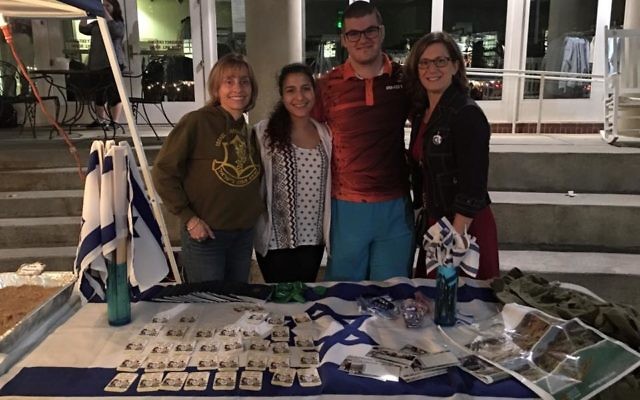Queens, Rabbi Make Jewish Students Welcome
A little over 1 percent of the student body identifies as Jewish, including two students from Atlanta.

Nestled on a beautiful, lush campus in the Myers Park area, Queens University of Charlotte is a private gem of higher education.
Known for its business school, arts, sports and now a growing Jewish student body, the Presbyterian-affiliated school of 2,300 students hired its first rabbi about a year ago: Rabbi Judith Schindler, the director of the Stan Greenspon Center for Peace and Social Justice and an associate professor of Judaic studies.
Rabbi Schindler took the Queens job after 18 years at Charlotte’s largest synagogue, Temple Beth El.
Although religious identification is not required on the university’s application, Rabbi Schindler said 25 students during the 2016-17 school year identified as Jewish on the application or through Hillel. That’s just over 1 percent of the student body.
Those Jewish students included two Atlantans: Morasha Winokur, daughter of Rabbi Harvey and Donnie Winokur of Temple Kehillat Chaim, and Simon Hirschhorn, who graduated in May.
Founded in 1857 as the Charlotte Female Institute, Queens went coed with nonresidential men after World War II. Always part of the Presbyterian Church USA (with a few changes over the years), the school has grown in the areas of religious and multicultural inclusion. Now the curriculum has expanded, as well as faculty.
Rabbi Schindler has taken a hands-on approach to her new role at Queens. She hosted more than 30 students at a Passover seder in April, and she hopes to see the number of Jewish students on campus continue to increase.
The university set out to increase Jewish life and learning experiences in 2013, Rabbi Schindler said.
Hirschhorn was the first student who identified as Jewish in 2013. On applications for this year’s freshman class, Rabbi Schindler said, 15 students self-identified as Jewish.
In 2014, Hillel popped up on campus, and Talli Dippold was hired as the first director of Jewish life. On the heels of her joining the staff, Jewish cultural programs began to blossom as the Hillel group solidified.
Hillel, Rabbi Schindler said, is a small but strong presence.
With Shabbat dinners, biweekly breakfasts and the High Holidays, students have made Hillel a place of family, she said. The Queens campus is only five miles from the Levine Jewish Community Center campus, which houses all of Charlotte’s synagogues, so students aren’t far from the Jewish community at large.
“Our students love that Jewish life at Queens is a new program and they can be part of crafting it,” Rabbi Schindler said. “While historically Queens has Presbyterian ties, its effort to include all faiths are sincere. There is even a Muslim prayer space in the chapel. The fact that our small campus has both a director of Jewish life and a rabbi who serves as an associate professor of Judaic studies, works with Hillel and is part of the university’s diversity, inclusion and community engagement initiative says it all.”
The university hired her last fall when it created a Judaic studies minor.
Rabbi Schindler had decided she wanted to grow as a scholar, and the Queens opportunity allowed her to study, teach, write and lecture as a visiting scholar in other communities, she said.
She’s co-writing a book with Charlotte community advocate Judy Seldin-Cohen, due to be published by CCAR Press in December: “Recharging Judaism: How Civic Engagement Helps Synagogues, Jews and America.”
Besides professional endeavors, Rabbi Schindler said, “I was drawn to Queens University because I love the students. Whether we are studying the Holocaust, human rights or the Hebrew Bible, they love to learn, to debate, to be challenged and to challenge each other.”
She said the faculty at the university was also a draw. “The faculty with whom I work are not only scholars who have a passion for their academic areas of expertise, but put their students’ needs front and center, and they are great colleagues and human beings.”
It was shortly after she gave 18 months’ notice of her retirement after 18 years at Temple Beth El that a 130-page exploratory study from Queens on establishing a Center for Holocaust education and collective justice landed on Rabbi Schindler’s synagogue desk. She said the match between herself and the university was beshert, or meant to be.
Her father fled Munich, Germany. Her Aunt Judy, for whom she is named, died at Auschwitz. Her grandfather spoke out against Hitler during World War II. Now she uses education, social action and exceptional leadership to direct the Stan Greenspon Center for Peace and Social Justice.
“I was drawn to Queens University not only because I was honored to become an associate professor of Judaic studies and be challenged in new ways, but I was blessed that Stan Greenspon committed to generously endowing the Stan Greenspon Center for Peace and Social Justice,” she said. “Our center engages hundreds of teachers in workshops on teaching the Holocaust and human rights, and we teach and reach thousands of students.”
She said the Greenspon Center engages in social justice advocacy, established a refugee advocacy network last fall and hopes to add racial justice to its agenda this year.
So even on the lush, green campus of what was once a women’s Presbyterian college in a Southern city with a Jewish community of about 11,000 people (according to the Charlotte Jewish Federation in 2014), warmth and acceptance are greeting a growing Jewish student population at Queens University.
“I love watching our students grow up and find themselves, their passion and their life’s path,” Rabbi Schindler said.



comments